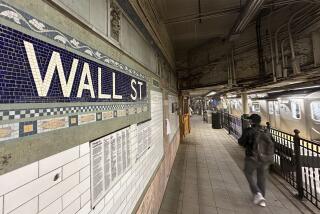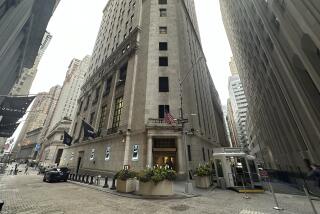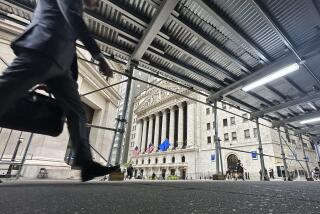TURMOIL FOR INVESTORS : Bonds Tumble; Stock Market Braces for a Hectic Monday
NEW YORK — New evidence that a powerful economic expansion is underway sent bond prices tumbling Friday and heightened fears that the stock market decline might accelerate next week.
Monthly employment figures released Friday were far stronger than expected, prompting renewed concern about inflation. That in turn caused a dramatic sell-off in the bond market, with 30-year U.S. Treasury bond prices tumbling as much as $20 per $1,000 bond and yields climbing as high as 7.28% before closing at 7.26%.
Stock exchanges were closed for Good Friday, forestalling immediate reaction to the news by equity investors. In light currency trading, the dollar rose against all the major world currencies on the economy’s strength, closing at 103.60 yen in New York, up from 102.60 late Thursday.
But stocks were pummeled all week in very heavy trading, and the job figures combined with the bond market reaction could put new downward pressure on share prices when trading resumes Monday.
Indeed, brokerage houses and mutual fund companies were bracing for a tumultuous day Monday. Mutual fund leader Fidelity Investments, for example, said it had additional staff on hand over the last week and will keep them in place to cope with a possible flood of activity Monday.
“Wall Street was very late to recognize the strength of the economy,” said David Hale, chief economist at Kemper Financial Services in Chicago. “It will be a bad Monday.”
The Dow Jones industrial average lost 138 points during the week, though it closed up 9 Thursday after a roller coaster day that saw the market down 65 points in early trading. With the Federal Reserve expected to push interest rates up once again in response to the strong economic news, most market watchers expect further declines.
Still, Hale and other analysts cautioned that Friday’s bond market drop may have been an overreaction. Trading was very light as a result of the holiday; bond markets are typically closed on Good Friday, but with the market tumult, many dealers opened for an abbreviated trading day that ended at 11:00 a.m. in New York.
“The (job) figures aren’t really as strong as they look on the surface, so maybe after some thought over the weekend the markets might not react quite as strongly,” said Lyle Gramley, a former Federal Reserve Board governor and now consulting economist for the Mortgage Bankers Assn.
Interest rates are not the only thing putting pressure on stock prices. Hale noted that politics are in flux in nearly all the major industrial countries--not to mention trouble spots like Mexico and Korea.
In addition, many large investment pools known as hedge funds have sustained enormous losses in bond trading and are being forced to liquidate holdings, further depressing prices.
There remains little consensus, however, on whether the current stock slide is merely a “correction” that will soon end or the beginning of a long bear market. And many traders are waiting anxiously to see whether the new mutual fund customers who have been drawn to a bullish stock market over the past year will now head for the exits.
Selected Interest Rates: Averages of daily rates ended Thursday, in percent:Corporate AAA bonds 7.61%, 90-day CDs 3.80%, 3-month Treasury bills 3.50%, Bank prime rate, 6.25%, Municipal bonds 5.92%, Federal funds rate 3.49%, Discount rate 3.00% Source: Federal Reserve Board
More to Read
Inside the business of entertainment
The Wide Shot brings you news, analysis and insights on everything from streaming wars to production — and what it all means for the future.
You may occasionally receive promotional content from the Los Angeles Times.










